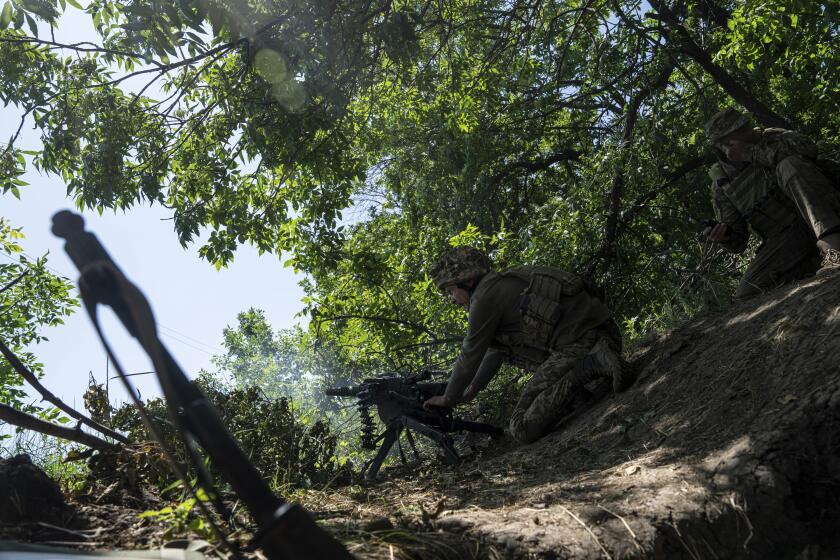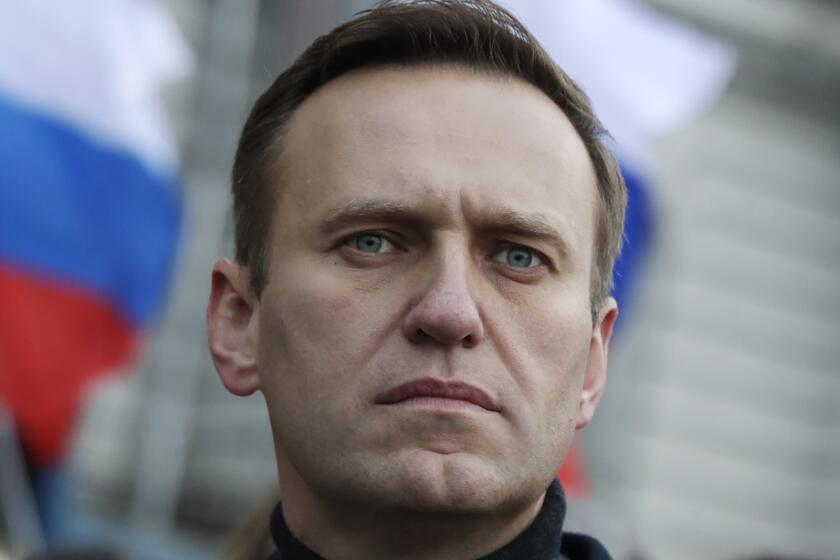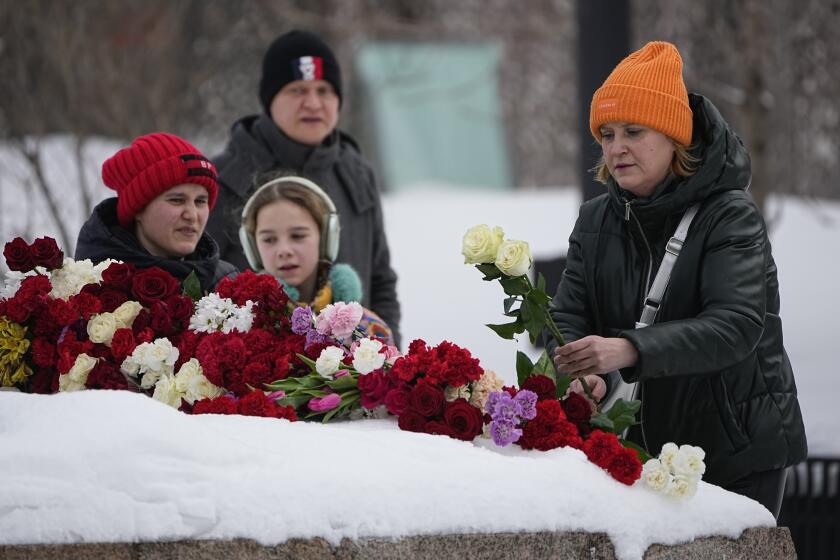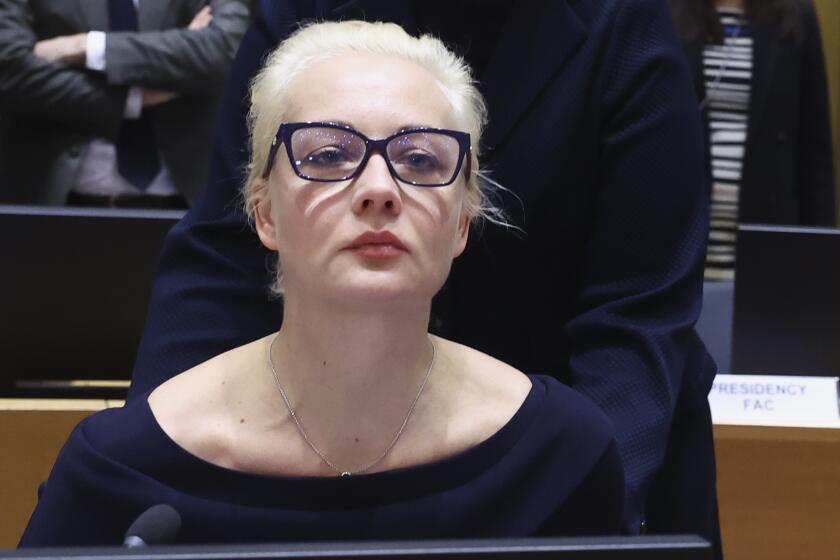Stalled U.S. aid for Ukraine underscores GOP’s shift away from confronting Russia
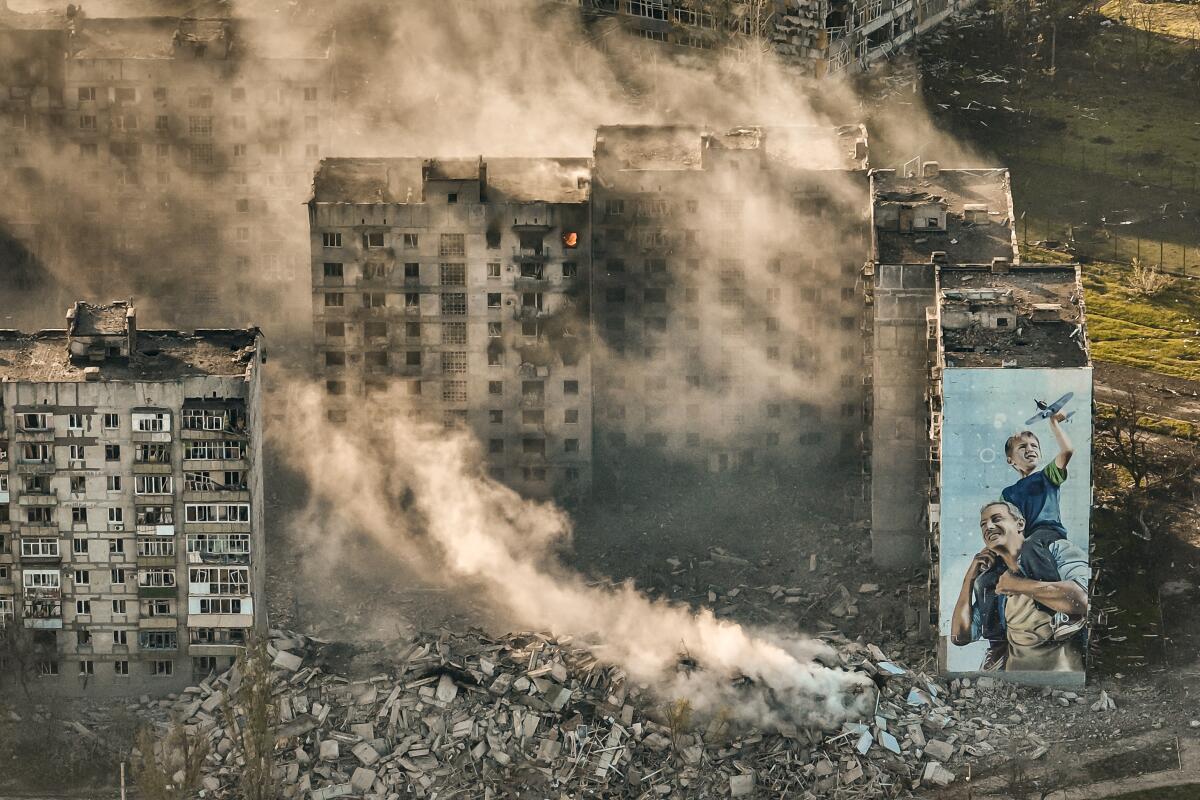
- Share via
About 2 a.m. last Tuesday, Republican Sen. Ron Johnson of Wisconsin stood on the Senate floor and explained why he opposed sending more aid to help Ukraine fend off the invasion launched in 2022 by Russian President Vladimir Putin.
“I don’t like this reality,” Johnson said. “Vladimir Putin is an evil war criminal.” But he quickly added: “Vladimir Putin will not lose this war.”
That argument — that the Russian president cannot be stopped so there’s no point in using American taxpayer dollars against him — marks a new stage in the Republican Party’s growing acceptance of Russian expansionism in the age of Donald Trump.
The GOP has been softening its stance on Russia ever since Trump won the 2016 election after Russian hacking of his Democratic opponents. There are several reasons for the shift. Among them, Putin is holding himself out as an international champion of conservative Christian values and the GOP is growing increasingly skeptical of overseas entanglements. Then there’s Trump’s personal embrace of the Russian leader.
Now the GOP’s ambivalence on Russia has stalled additional aid to Ukraine at a pivotal time in the war.
The Senate last week passed a foreign aid package that included $61 billion for Ukraine on a 70-29 vote, but Johnson was one of a majority of the Republicans to vote against the bill after their late-night stand to block it. In the Republican-controlled House, Speaker Mike Johnson said his chamber will not be “rushed” to pass the measure, even as Ukraine’s military warns of dire shortages of ammunition and artillery.
Dwindling ammunition threatens Ukraine’s hold on the front line under a withering assault by Russian artillery.
Many Republicans are openly frustrated that their colleagues don’t see the benefits of helping Ukraine. Putin and his allies have banked on democracies wearying of aiding Kyiv, and Putin’s GOP critics warn that NATO countries in Eastern Europe could become targets of an emboldened Russia that believes the U.S. won’t counter it.
“Putin is losing,” Republican Sen. Thom Tillis of North Carolina said on the floor before Johnson’s speech. “This is not a stalemate.” Senate Minority Leader Mitch McConnell of Kentucky was one of 22 Republican senators to back the package; 26 opposed it.
Alexei Navalny, Russia’s best-known opposition figure, has died in a prison colony, authorities say. Biden and other Western leaders blame Putin.
The divide within the party was on stark display Friday with the prison death of Russian opposition figure and anti-corruption advocate Alexei Navalny, which President Biden and other world leaders blamed on Putin. Trump notably stood aside from that chorus Monday.
Offering no sympathy or attempt to affix blame, Trump posted on Truth Social that the “sudden death of Alexei Navalny has made me more and more aware of what is happening in our Country. It is a slow, steady progression, with CROOKED, Radical Left Politicians, Prosecutors, and Judges leading us down a path to destruction.”
Nikki Haley, his Republican presidential primary rival, said Monday that Trump is “siding with a thug” in his embrace of Putin.
Tillis responded to Navalny’s death by saying in a post, “History will not be kind to those in America who make apologies for Putin and praise Russian autocracy.”
A rights group says hundreds have been detained in Russia while paying tribute to opposition leader Alexei Navalny, who died at an Arctic prison colony.
Within the Republican Party, skeptics of confronting Russia seem to be gaining ground.
“Nearly every Republican Senator under the age of 55 voted NO on this America Last bill,” Missouri Sen. Eric Schmitt, elected in 2022, posted on the social media site X after the vote last week. “15 out of 17 elected since 2018 voted NO. Things are changing just not fast enough.”
Those who oppose additional Ukraine aid bristle at charges that they are doing Putin’s handiwork. They contend they are taking a hard-headed look at whether it’s worth spending money to help the country.
“If you oppose a blank check to another country, I guess that makes you a Russian,” Alabama Sen. Tommy Tuberville said on the Senate floor, after posting that conservative commentator Tucker Carlson’s recent controversial interview of Putin shows that “Russia wants peace” in contrast to “DC warmongers.”
The widow of Russian opposition leader Alexei Navalny vows to continue his fight against the Kremlin and to punish Putin for his death in prison.
Rep. Matt Gaetz, a leading opponent of Ukraine aid in the House, described the movement as “a generational shift in my party away from neoconservatism toward foreign policy realism.”
Even before Trump, Republican voters were signaling discontent with overseas conflicts, said Douglas Kriner, a political scientist at Cornell University. That’s one reason Trump’s 2016 promise to avoid “stupid wars” resonated.
“Some of it may be a bottom-up change in a key part of the Republican base,” Kriner said, “and part of it reflects Trump’s hold on that base and his ability to sway its opinions and policy preferences in dramatic ways.”
Trump has long praised Putin, calling his invasion of Ukraine “smart” and “savvy,” and recalling this month that he had told NATO members who didn’t spend enough on defense that he would “encourage” Russia to “do whatever the hell they want” to them. He reiterated that threat days later.
Despite the reluctance within the GOP to continue supporting Ukraine, Russia remains deeply unpopular in the U.S. A July 2023 Gallup Poll found that just 5% had a favorable view of Putin, including 7% of Republicans.
But Putin has positioned his country as a symbol of Christian conservatism and resistance to LGBTQ rights, while portraying himself as an embodiment of masculine strength. The combination has appealed to populist conservatives across the Western world. Putin’s appeal in some sectors of the right is demonstrated by Carlson’s recent tour of Russia, after which the conservative host posted videos admiring the Moscow subway and a supermarket that he says “would radicalize you against our leaders.”
“The goal of the Soviet Union was to be the beacon of left ideas,” said Olga Kamenchuk, a professor at Northwestern University. “Russia is now the beacon of conservative ideas.”
When Putin attacked Ukraine, there was bipartisan condemnation. Even a year ago, most Republicans in Congress pledged support. But around the same time, Trump was lamenting that U.S. leaders were “suckers” for sending aid.
By the fall, the party was divided. Republicans refused to include another round of Ukraine funding in the government spending bill, insisting that Democrats needed to include a border security measure to earn their support.
After Trump condemned the compromise border proposal, Republicans sank the bill, leaving Ukraine backers no option but to push the assistance as part of a foreign aid package with additional money for Israel and Taiwan.
Several experts on Russia note that the rhetoric the GOP uses against Ukraine aid can mirror Putin’s own — that Ukraine is corrupt and will waste the money, that the U.S. can’t afford to look beyond its borders and that Russia’s victory is inevitable.
“He’s trying to create the perception that he’s never going to be beaten, so don’t even try,” Henry Hale, a George Washington University political scientist, said of Putin.
Skeptics of Ukraine aid argue that the war has already decimated the Russian military and that Putin won’t be able to target other European countries.
But several experts noted that Putin has alluded to plans to retake much of the former Soviet Union’s territory, which could include NATO countries such as Lithuania and Estonia that the U.S. is obligated under its treaty to defend militarily.
Sergey Radchenko, a professor at Johns Hopkins University’s School of Advanced International Studies, noted that Russia for decades has hoped that the U.S. would lose interest in protecting Europe: “This was Stalin’s dream, that the U.S. would just retreat to the Western Hemisphere.”
AP writers Joey Cappelletti in Waterford Township, Mich., and Mary Clare Jalonick and Lisa Mascaro in Washington contributed to this report.
More to Read
Sign up for Essential California
The most important California stories and recommendations in your inbox every morning.
You may occasionally receive promotional content from the Los Angeles Times.
